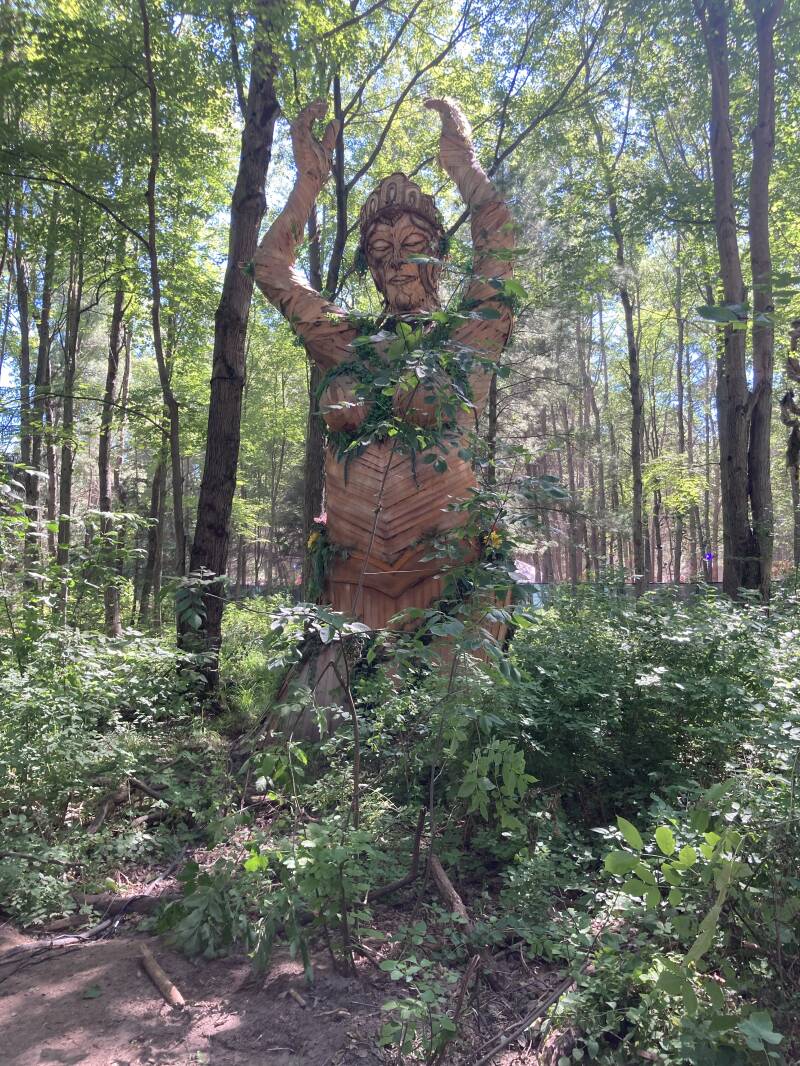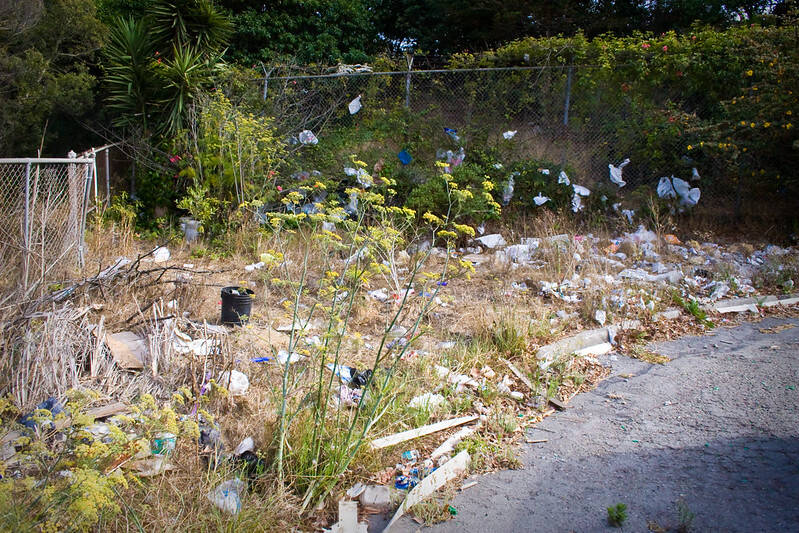
In a world marked by loneliness and disconnection, we've lost touch with the enchanting and enspirited world that surrounds us. Centuries of corrupted Western philosophy have pushed us away from the vibrant essence of our habitat. When we look around, we see a world filled with lifeless and separate objects. The consequences of this separation are troubling. I'm especially concerned about the widespread concept of disposability, which may have roots in history, from flaunting wealth through wastefulness to the rise of industrial canning from 1810 to 1860. Who knows? Regardless, I have witnessed our culture's tendency to demonstrate disposability and waste on a city-wide scale, and it horrifies me.
In 2022, I traveled to the renowned Midwest music festival, Electric Forest. Knowing I would be camping, I brought my usual backpacking gear—tent, sleeping bag, sleeping pad, etc.—along with food, a stove, and other necessities. Over the five-day festival, Electric Forest transformed into a city of approximately 40,000 people.
I am aware that festivals like Burning Man and Coachella have made worldwide news due to the ecological damage they cause, but I had never experienced it firsthand. On the day of our leave-taking, our group site was meticulously cleaned of garbage. However, one of our fellow campers had a broken tent pole on his four-year-old tent. Instead of getting a replacement (which would cost around $10), he chose to throw the whole tent away and buy a new one since his was worn. It was discarded on one of the numerous garbage heaps at the corner of each zone.
This was disheartening, and it was only the beginning. As we loaded our belongings and made our way to the exit in our car, we passed by campsites where entire setups had been abandoned, left to be thrown away or scavenged for sellable items. This was a common occurrence at this festival, as the "pickers" would sell salvaged goods to fund their tickets for the next year (keeping money in a destructive economic cycle). As we continued, I became increasingly furious at what I saw. We reached a road along the border of the Electric Forest property, where cars came to a stop alongside a miles-long fence covered in the windblown garbage of thousands. I felt the impact as if it were affecting my own spirit.

This photo is representative--I was too busy picking up garbage to take a picture...
Credit: Orin Zebest
I got out of the car and spent two hours collecting bag after bag of garbage, using the windblown garbage bags from the fence, which had been provided by the festival to campers. I passed hundreds of cars, their occupants sleeping or hungover, trying to escape the 90+ degree heat, their engines running in the gridlocked traffic. I was nearly in tears when a driver opened his window to shout his thanks, to which I replied, "Don't thank me—help me!" No one did. Not one of the thousand people sitting in their cars, watching and waving their "thanks."
When I returned to the car, still infuriated, one of my fellow travelers, who had sat in the air-conditioned car, barely conscious after only three hours of sleep, became defensive and mentioned that the festival hires cleanup crews to handle the mess after the grounds have emptied. I couldn't help but wonder how much had blown over the fence or beyond the other boundaries of the festival grounds. How much ended up buried in the soil? How many "ground scores" were trampled into the grass, left to be mowed over and contaminate the ground on which we all danced in reverence? How much garbage blew into the nearby lake, and how much would reach the properties of neighboring residents? How much would eventually make its way to Lake Michigan, just an hour away? My companion fell into angry silence when I gestured to the garbage-lined fence and told him that this was his legacy as much as any other festivalgoer, cleanup crews or not.

I have resolved never to attend a festival like this again. Such a maleficence cannot be defeated by one person, but I can choose not to participate. I hold the attendees, the creators of such a festival, and the culture that sustains it responsible. On this, my mind cannot be changed. Sometimes, we must face hard truths.
To change ourselves, our actions, and the world, we must rediscover our enchantment with the world and our experience of it. To be enchanted is to be bespelled, filled with delight, feeling as though your heart is singing in response to the beauty of the world, a person, or a sensation. One does not harm something so beautiful and gifted.
This sense of enchantment must come from within us. It's already out there; we just need to relearn how to experience it. When we cannot experience delight and joy within ourselves, we seek it elsewhere, often indulging in consumerism and abusing our relationships with food, medicine, and people. Due to our lack of enchantment and the disease of disposability, we fail to connect with others on a deeper level. This is a manifestation of our lack of care for those who provide us with many gifts, and as a culture, we have become heart-blind.
Our culture is making great strides in many ways with the decriminalization of certain medicines. However, we still need to heal our relationships with these substances to rediscover our enchantment. At Electric Forest, as in many festival communities, drug use is common, as are cases of overdose and psychological breakdown. What if the drugs used in these communities shifted from being a means of unhealthy escapism and careless recreation to intentional medicine, fostering wisdom-inducing relationships? To many, this might seem like a pipe dream. Perhaps it is, but those who have dreamt with this particular pipe have done so with intention and a caring relationship, because the world that can be created with intention offers hope and power. The odd ones in our culture, those who engage in the esoteric and embrace the unconventional, are onto something. The real challenge is to avoid being ensnared by the net of acceptability.
"Counter culture," as we know it, is popularized and vetted by the mainstream. The real subversives are the quiet ones who tend to their gardens, converse with their plants, and remain curious when the beings of the world communicate back in subtle song. They are wary, and rightfully so. This enchanted world is not "good vibes only." There are unsavory spirits, and the key to changing our world lies in how we relate to them and to others.

We will know when we have achieved re-enchantment when we can have a sober conversation with a tree out of genuine curiosity, and when these drugs return to being medicines that help us see a greater world. There are those who are already doing the work to facilitate this reconnection, and I like to think I am one of them.
When you become enchanted with the world again, you become empowered, a force for change. Don't be blind to the beings of the world or to the need for change within yourself. As I recently, albeit brutally, told a friend of mine, "To continue in the pattern you are, knowing what you do, is a willful act of self-harm." These patterns are almost always impossible to break out of on our own. It is in community, solidarity and the terrifying wilderness of the unknown that we are able to change for the better. We are all affected by the patterns and traumas of our ancestors and relatives, and we pass these on to our descendants. Now is always the time to begin. What legacy will you choose to leave? One of harm or one of healing?
For further reading check out Greer’s articles on enchantment and Sharon Blackie’s books If Women Rose Rooted and Hagitude.


Add comment
Comments